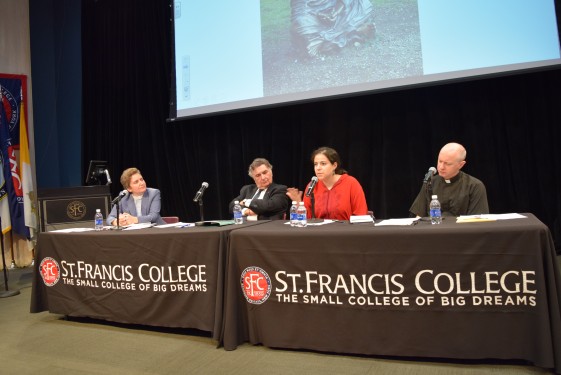By Antonina Zielinska
A Catholic, a Jewish, a Muslim and a Protestant leader got together at St. Francis College last week to talk about Mercy.
“God has 91 names in Islam: all knower, the punisher, but of all the names the first phrase of the Quran emphasizes this specific trait of God,” said Iman Boukadoum, director of Community Partnerships at the Interfaith Center of New York. An English translation of that first line is: “In the name of God, most gracious, most merciful.”
She said mercy is on the lips of Muslims throughout the world many times a day as it is often referred to in common prayers.
“Compassion as mercy is at the heart of Islam,” she said.
Of course, Boukadoum said, mercy is nothing without deeds. Therefore, she said, her faith has led her to her work as an attorney helping immigrants in this country, welcoming the stranger as the Quran commands. Actions show holy mercy because as she said, “All are children of God.”

“For Catholics, mercy in action is the outgrowth of what we believe,” said Father Joel Warden, C.O., pastor of the Oratory Church of St. Boniface, Downtown Brooklyn, and administrator of Assumption of the Blessed Virgin Mary parish, Brooklyn Heights.
He spoke to those present about Pope Francis’ call to mercy through this specially designated Year of Mercy encouraging all Catholics to perform acts of spiritual and corporal works of mercy.
Father Warden said mercy must be a habit to be a virtue, performed often.
“For you to be severe is a violation of Jewish tradition, of all faith traditions,” said Rabbi Joseph Potasnik, executive vice president of the New York Board of Rabbis.
Having listened to the Catholic and Muslim presentations, the rabbi said had the speakers not identified themselves, it would have been difficult to tell which religion they practiced solely on their explanation of mercy.
“We are different branches but have the same roots,” he said.
The three speakers and moderator Rev. Dr. Barbara Senecal-Davis, executive minister at First Presbyterian Church, Greenwich Village, were invited to the Brooklyn Heights campus for a panel dis- cussion as part of a special Year of Mercy St. Francis-St. Clare Week at St. Francis College.
As the speakers further discussed their faith traditions, some difference in philosophy surfaced.
The rabbi spoke of the Jewish understanding of seeking reconciliation. First, one must forgive God, then others and finally, oneself, he explained.
In explaining the necessity to forgive God, the rabbi said it comes from our necessity to act as God acts.
“Forgiveness is a reciprocal force,” he said. He also said: “God created an imperfect world”
Boukadoum explained that in Islam there is no concept of original sin; there is forgetfulness.
“When you forget the pillars, you have to go back to the pillars,” she said.
Speaking of violence done in the name of Islam, she said it is often hard for people to be true to their faith. Violence is against Islam, she said, but goodness is humble.
If one were to only look at the news headlines regarding any religion, one would be discouraged from any of the major faiths, but true believers accomplish their work in humility and are often not recognized, she said.
